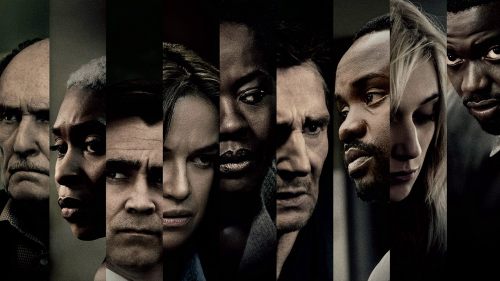WIDOWS And Steve McQueen’s Cinema Of Loss
Widows is out this week. Get your tickets here!
Loss runs deep through the feature films of British director Steve McQueen as they explore the survival mechanisms developed by people facing physical, psychological and social privations, and his new film Widows is no exception, anchored as it is on bereavement.
McQueen’s early life in 1980s West London contains a formative loss: institutional discrimination in the education system assumed the dyslexic, lazy-eyed son of working-class Grenadian parents had no potential, and deprived him of academic opportunity. Setting this rejection aside, he persevered in developing his innate artistic talents, winning the 1999 Turner Prize with his short film Deadpan, a five minute reworking of Buster Keaton’s house frontage stunt from Steamboat Bill, Jr. in which the artist himself, dominating the frame, remains stoic in the face of disaster.
McQueen’s 2008 debut feature, Hunger, shares his early art films’ focus on human bodies. Largely told through provocative, exquisitely-composed images, its story of Bobby Sands’ 1981 hunger strike depicts loss at multiple levels, starting with the liberty lost by men spurred to action by Ireland’s lost unity. The prisoners respond to incarceration by exerting control over their bodies and environment with nakedness, shaggy hair and shit-smeared walls, and the escalating brutality with which the authorities respond to their own loss of control dehumanises them just as much as they dehumanise their charges. Deprived of all other avenues of protest, Sands’ hunger strike and attendant loss of weight becomes a radical act of self-reclamation from those who would control his body, his very life fair trade when weighed against his integrity and his cause.
Following his harrowing portrayal of Sands’ final days, Michael Fassbender’s body was again a focus of Shame, McQueen’s 2011 sophomore feature. The trauma at the root of siblings Sissy and Brandon Sullivan’s fractured relationship is never elucidated, but has exacted complementary costs: his ability to form emotional bonds and hers to exist without them. Brandon fills this void with constant, furious sex, Sissy with chaotic, clinging attachment, but her disruption of his carefully regimented existence exposes his impotence in situations of emotional intimacy, triggering a descent into self-destruction mirrored by the escalating self-harm with which Sissy expresses her own distress. Her near-fatal rending of flesh finally penetrates Brandon’s emotional barriers in a moment of rain-soaked, grief-filled catharsis, an admission that, despite their conflict, without one another they are both lost.
Solomon Northup is not lost but stolen in 2013’s 12 Years A Slave, its Antebellum South slave narrative merging seamlessly with McQueen’s preoccupations and lent an extra dimension by his heritage. Freedom, name and individuality stripped away by men who would deny his very humanity, Northup assumes basic human decency and equality will prevail if he simply demonstrates his skill and intelligence, but is disabused of this by the horrors visited upon the enslaved. Taking solace in their community and shared pain, he refuses to give up hope that a reckoning will come, even as he smashes the fiddle which symbolises his former life, and when salvation finally restores his freedom, Northup asks his family not for pity, but forgiveness for the time together they have lost and the grief they have endured.
Following these highly formal, distinctively arthouse movies with an adaptation of a 1983 British TV mini-series about a heist gone wrong might seem like McQueen taking a step towards the purely commercial, but his connection to the material goes back to his childhood, watching Widows with his family and identifying with its characters’ determination to survive their own loss and the discrimination they experience.
Writer Lynda La Plante conceived the series in response to the thinly-written women she was offered in her acting career, but rather than being simply a conventional heist thriller with flipped genders, Widows takes great pains to ground the drama in complex female characters which are explored from every angle. A bungled armed robbery deprives the widows of their means of support but also frees them to make new lives for themselves, and their response to this new-found independence drives the narrative as they learn new skills and work through their mourning, using male chauvinism against itself just as much as they empower each other while outwitting the men in the story at every turn, police and gangsters pushed to the sidelines as they trip over their own egos. The series was a phenomenon and still stands up after 35 years, full of muscular brutality and grounded performances, its plotting watertight and smoothly propulsive.
2018’s Widows has more on its mind and is in some ways less pure than 1983’s, but telescoping ten hours of TV down to a cinematic running time demands sacrifices and McQueen, working with Gone Girl writer Gillian Flynn, faithfully preserves the spine of La Plante’s narrative while playfully reworking scenes and details which bolster it thematically. Transplanting the film from '80s London to modern-day Chicago allows it to better address socioeconomic inequality while drawing a parallel between these cities’ histories of organised crime and urban renewal. Without the luxury of time to sketch the husbands through their widows’ eyes, McQueen depicts them in flashbacks which reveal new layers of character while also establishing the technique in the film’s grammar, opening up its use in deepening the widows’ motivations. The police procedural subplot is discarded entirely, replaced by an exploration of racial dynamics and political corruption not attempted by the series but built on the restoration of lost money which drives its gangster subplot, in turn laying the foundation for robust displays of McQueen’s signature visual filmmaking and extended dialogue.
Widows may seem more immediately commercial than the rest of Steve McQueen’s filmography, but still sits easily among his other films: its rhythms are quite unlike those of other heist movies, its focus firmly on character dynamics rather than plot mechanics, its aesthetic a fusion of elegant composition and documentary realism. Far from abandoning McQueen’s artistic sensibilities, Widows expands upon them with its embrace of mainstream cinema, a defiant declaration that loss need not be the end and its victims can not just survive, but thrive.



